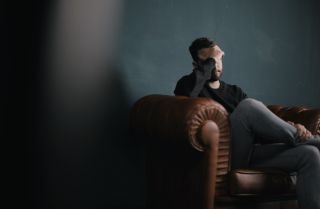Bias
Why We Believe Things Are Getting Worse When They Aren’t
Our brains prioritize negative information, leading to a negative bias.
Updated June 29, 2023 Reviewed by Davia Sills
Key points
- Most people believe morality is in decline globally when clear evidence refutes that negative belief.
- The brain's negative bias can lead to anxiety disorders and depression if left unchecked.
- Awareness of one's natural bias can help balance one's perceptions and improve well-being.

A client I’ll call Tim came to see me for anxiety and depression. A 45-year-old married father with two children, he was financially successful yet tormented with a deep feeling of foreboding. “My children are growing up in a world with no morals. I don’t know what will happen to them. I feel like everything is getting worse. I can’t sleep at night. I’m always worried that something terrible will happen,” he said.
Like many of us, Tim believes that society is getting worse and that his children live in a more dangerous world than the one he grew up in. We read about daily violence, the decline of the traditional family, and changing social norms and assume that society is headed to a dark abyss. When our mind predicts a bleak future, feelings of hopelessness and helplessness often follow. As those feelings fester, anxiety and depression can develop (Norris, C., 2019).
A recent study surveying people in 60 countries found that most believe morality is declining globally. People think that kindness, honesty, and ethics are in a downward spiral (Mastroianni, A.M., Gilbert, D.T., 2023). That belief has remained consistent for the last 70 years. Yet reports about the morality of our neighbors, friends, and families have not changed. We still see most people around us as good and decent. A meta-analysis of 511 studies with over 63,000 subjects over the past 61 years showed an 8 percent improvement in cooperation between strangers. Our social systems of cooperation have improved over time, not gotten worse (Mingliang, Y. et al., 2022).
Many of the people in my own life work tirelessly in harmonious groups to bring food to the needy, help underprivileged youth write college essays, build homes for the homeless, provide education to the needy, and many more examples of good work by good people for the greater good of society. So why do all the negative stories stick in our heads?
Why We Believe Things Are Getting Worse
The human brain possesses a natural bias to prioritize negative information. We must consider potential dangers and plan to protect ourselves and our families effectively. Yet we need not feel unsafe in our community if something terrible happened 3,000 miles away. If the constant barrage of violent videos and hostile human interactions make us develop an anxiety disorder or depression, a reality check might improve our health and well-being (Noworyta, K. et al., 2021).
Journalists are familiar with the axiom, “If it bleeds, it leads,” meaning bad news will get the most attention. Most news programs and clickbait headlines lean toward the negative. Shocking stories of human cruelty keep us watching and help companies sell more products. The more we consume tragic stories, the more our bias skews negative. Consequently, our memories become negatively biased as well. The more we share those stories with others, the more widely dismal beliefs spread (Soroka, S., 2019).
Are Things Really Getting Better?
Harvard psychology professor Steven Pinker shares research data showing that human life on planet Earth has never been safer, healthier, or more cooperative (Pinker, S., 2018). Global poverty has decreased, with 130,000 fewer people living in extreme poverty every day on average since 1990. Only about 10 percent of those over 15 could read in 1800. Now 85 percent of the population is literate. Child mortality dropped from 43 percent in 1800 to 3.9 percent in 2017. Humans live more freely than ever before, even with the wins and losses of human rights cases (Roser, M., 2020).
The Availability Heuristic
We’re all influenced by a cognitive bias called the availability bias (availability heuristic), where we tend to overestimate the likelihood of events readily available to our memory. That usually means emotionally charged memories or recent events. I’ll share a personal example.
On 9/11, I was teaching a college psychology class when campus police ordered us to evacuate. My students and I left the campus listening to news reports of the attacks in a surreal contrast of the strange and ordinary. A few days later, a client called me, extremely agitated to learn that a relative had information relevant to the 9/11 investigation.
With the FBI involved and the emotions of the day highly charged, I left work that evening excessively preoccupied with thoughts of terrorism and connections too close to home. I unlocked my car, sat in the driver’s seat, and tossed my purse onto the passenger seat when I heard a crunch of broken glass. I leaped out with the immediate thought, “A terrorist attacked my car!” I took a moment to notice my broken window and the missing black canvas waste basket. I finally realized my broken window was more likely due to a common theft than a terrorist attack.
On the way home, I recognized my leap to the availability bias. Under stress, the mind can make many erroneous assumptions. So how do we inoculate ourselves from the negativity bias? Here are three ways to counteract it and improve well-being:
- Become intentional about the media you consume. If you wish to be well-informed, read a daily newspaper and a monthly news magazine. Don’t watch videos of violence and cruelty.
- Aim your attention to the things you truly value. Lead your attention toward your goals rather than passively following the work of marketers.
- Look for the good and amplify that. Subscribe to uplifting blogs and magazines. Choose blogs, podcasts, and periodicals that educate and inspire you.
No one is free from cognitive bias. It helps to be gentle with yourself and others, as we’re all guilty of faulty thinking. Yet we can help each other by sharing all the good stories our hearts and memories can hold.
References
Mastroianni, A.M., Gilbert, D.T. (2023). The illusion of moral decline. Nature 618, 782–789 https://doi.org/10.1038/s41586-023-06137-x.
Mingliang, Y. et al. (2022). Did Cooperation Among Strangers Decline in the United States? A Cross-Temporal Meta-Analysis of Social Dilemmas (1956–2017). Psychological Bulletin, Vol. 148, Nos. 3–4, 129–157 https://doi.org/10.1037/bul0000363.
Norris, C. J. (2019): The Negativity Bias, Revisited: Evidence from Neuroscience Measures and an Individual Differences Approach, Social Neuroscience, DOI: 10.1080/17470919.2019.1696225
Noworyta, K. et al. (2021). "Neuromolecular Underpinnings of Negative Cognitive Bias in Depression" Cells 10, no. 11: 3157. https://doi.org/10.3390/cells10113157.
Rozin, P. & Royzman, E. B. (2001). Negativity bias, negativity dominance, and contagion. Personal. Soc. Psychol. Rev. 5, 296–320.
Soroka, S., Fournier, P., & Nir, L. (2019). Cross-national evidence of a negativity bias in psychophysiological reactions to news. Proceedings of the National Academy of Sciences, 116(38), 18888–188892.




